
The controversy between al-Qaeda's branches in Iraq and Syria took an unexpected turn on the night of June 14, 2013, when an audio message surfaced from Abu Bakr al-Baghdadi, the head of al-Qaeda's branch in Iraq, the Islamic State of Iraq (ISI), defying Ayman al-Zawahiri's command that the group he created, the "Islamic State in Iraq and the Levant" (ISIL), be cancelled...
Special Report on the Power Struggle Between al-Qaeda Branches and Leadership: Al-Qaeda in Iraq vs. Al-Nusra Front and Zawahiri
By Rita Katz and Adam Raisman
The controversy between al-Qaeda's branches in Iraq and Syria took an unexpected turn on the night of June 14, 2013, when an audio message surfaced from Abu Bakr al-Baghdadi, the head of al-Qaeda's branch in Iraq, the Islamic State of Iraq (ISI), defying Ayman al-Zawahiri's command that the group he created, the "Islamic State in Iraq and the Levant" (ISIL), be cancelled. One week prior, on June 9, al-Jazeera had published a letter discovered in Syria from Zawahiri to Baghdadi and al-Nusra Front leader Abu Muhammad al-Julani resolving the issue and keeping both groups as separate entities. Then, on the morning of June 14, the Front's al-Manara al-Baydha' Media Foundation resumed its activity after being silent since the conflict began in April 2013.
One week prior, on June 9, al-Jazeera had published a letter discovered in Syria from Zawahiri to Baghdadi and al-Nusra Front leader Abu Muhammad al-Julani resolving the issue and keeping both groups as separate entities. Then, on the morning of June 14, the Front's al-Manara al-Baydha' Media Foundation resumed its activity after being silent since the conflict began in April 2013.
Jihadists' hopes for the settling of the conflict vanished and they became confused, with many doubting the authenticity of Baghdadi's message, as al-Fajr Media Center, the official online distributor of propaganda for the ISI and other al-Qaeda-affiliates, did not release it. Also, administrators of the top-tier jihadi forums al-Fida' and Shumukh al-Islam deleted any post giving a link to download the audio or merely discussing its content. However, in the days after the release, with the administrators being unable to suppress the high-volume of posts about the subject, the consensus was that the audio is indeed real. The authenticity of the audios was ultimately confirmed by administrators of the Shumukh al-Islam forum in a statement posted five days later, on June 19, thus bringing to the forefront issues about al-Qaeda and leadership, jihad in Iraq versus Syria, and the current track of the global jihadi movement.
What exists in Iraq and Syria between leaders of the ISIL and the al-Nusra Front is a power struggle, with one side demanding control over al-Qaeda's affairs in the two countries and keeping all the resources, and the other desiring independence from the Iraqi side and to report directly to al-Qaeda and Zawahiri. In the middle are jihadists who await Zawahiri not only to address the issue again, but to address them and speak to their concerns about the future of jihad in Iraq and Syria.
History of the ISI-al-Nusra Front Conflict
The ISI's al-Furqan Media Foundation released an audio message from Abu Bakr al-Baghdadi on April 8, 2013, in which he identified the al-Nusra Front as its branch in Syria and that both groups will be rebranded as the "Islamic State in Iraq and the Levant". This speech, titled, "And Give Glad Tidings to the Believers," was the first official confirmation of the relationship between the groups and that Abu Muhammad al-Julani was deputized to lead the al-Nusra Front. He stated:
"We laid for them the plans, and drew up for them the policy of work, and gave them what financial support we could every month, and supplied them with men who had known the battlefields of jihad, from the emigrants and the natives. They did well alongside their brothers from the sons of the Levant, and the influence of the Islamic State extended to the Levant. We did not declare this due to security reasons, and so that people see the truth of the State, far from the slander and falsehood of the media."

Baghdadi, taking command of both the ISI and the al-Nusra Front, declared that the names of both groups are cancelled and replaced with one title, the "Islamic State in Iraq and the Levant". This name, he argued, follows the path of unity that al-Qaeda in Iraq went upon when it became the Mujahideen Shura Council (MSC) and then the Islamic State of Iraq (ISI), as other groups pledged to it and fell under its banner.
Two days later, on April 10, Julani replied with surprise to Baghdadi revealing the groups' relationship, stating in an audio message that he was not consulted and he only found the news through the media. In particular, he found Baghdadi's announcement premature and lacking a basis in Islamic Shariah, and saw the ISI leader's mentioning of a new name as an "invitation," not a command, and turned it down, while at the same time going over Baghdadi to pledge allegiance to Ayman al-Zawahiri directly. He said:
"Therefore, I respond to the invitation of al-Baghdadi, may Allah preserve him, to rise from the lowest to the highest, and I say: This is a pledge of allegiance from the sons of the al-Nusra Front and their supervisor general that we renew to the Sheikh of Jihad, Sheikh Ayman al-Zawahiri, may Allah preserve him. We give a pledge of allegiance for obedience in good and bad, in emigration and jihad, and not to dispute with our superiors unless we see clear disbelief about which we have proof from Allah. The Front's banner will remain as-is, without changing anything, despite our pride in the State's banner and those who carried it and sacrificed their blood for it from among our brothers."

The issue of Julani rejecting the ISIL and asserting independence in managing the al-Nusra Front, and Baghdadi wishing to maintain control, exploded on jihadi forums and social networking websites. Jihadists found flaws in both men's arguments and questioned the timing of Baghdadi's revelation, and some, including prominent jihadists Abdullah bin Muhammad and Asad al-Jihad 2, believed that the ISI might have been infiltrated by enemy intelligence with the intention of destroying it from within. At the same time, releases from the ISI's al-Furqan and the al-Nusra Front's al-Manara a-Baydha' ceased, with no communiqué, audio or video posted since April 10. Instead, videos appeared on YouTube from the ISIL showing military operations and public executions in Syria. These videos did not come from an official source, like al-Fajr or the Global Islamic Media Front (GIMF), nor were they produced by the media arm of either the ISI or the al-Nusra Front, leading jihadists to speculate about this "Islamic State in Iraq and the Levant" being the same announced by Baghdadi.
Zawahiri Seemingly Resolves the Dispute
Al-Jazeera posted a two-page letter from Ayman al-Zawahiri dated May 23, 2013, that it reported having obtained from "reliable sources in Syria," in which the al-Qaeda leader seemingly resolved the dispute between the ISI and the al-Nusra Front. Zawahiri wrote that this was actually the second letter, as he wrote one the day after the release of Julani's audio message, trying to "contain" the conflict. He said that Baghdadi was wrong to have unilaterally announced the ISIL without consulting or informing al-Qaeda Central, and that Julani was also in error to have publicly announced his rejection of the new name and revealing the al-Nusra Front's relationship with al-Qaeda. While he cancelled the ISIL, Zawahiri also put both men on probation, stating:
"Abu Bakr al-Baghdadi al-Husseini is acknowledged as the Emir of the Islamic State of Iraq for one year from the date of this edict, after which the Shura Council of the Islamic State of Iraq sends a report to the General Command of al-Qaeda regarding the work, after which the general leadership decides on the continuation of Abu Bakr al-Baghdadi al-Husseini in the leadership or the taking over by a new emir.
"Abu Muhammad al-Julani is acknowledged as the Emir of the al-Nusra Front for the People of the Levant for one year from the date of this edict, after which the Shura Council of the al-Nusra Front for the People of the Levant sends a report to the General Command of al-Qaeda regarding the work, after which the General Command decides on the continuation of Abu Muhammad al-Julani in the leadership or the taking over by a new emir."
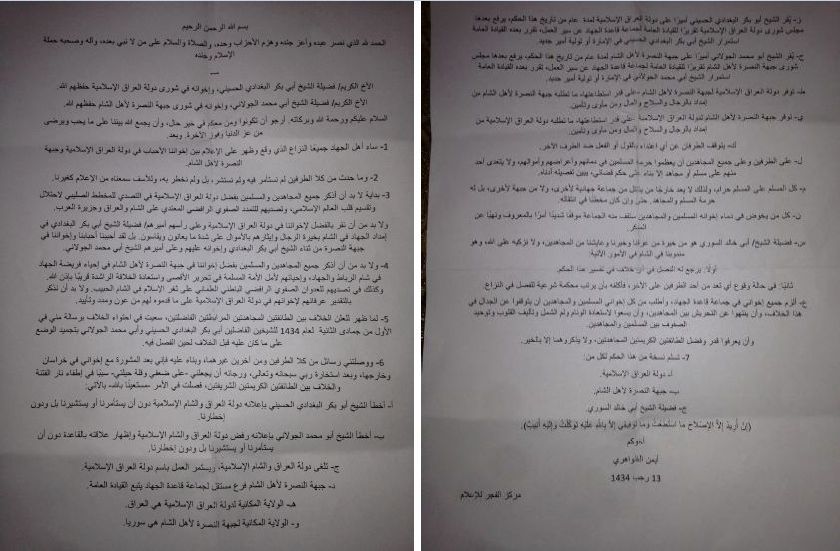
Further, Zawahiri tasked an individual named Abu Khalid al-Suri with arbitrating any disagreement with his order, and named him as al-Qaeda's representative in Syria. Abu Khalid is believed to be Muhammad Bahayah, who was a close associate of al-Qaeda strategist Abu Musab al-Suri AKA Mustafa Setmariam Nasser and a member of Usama bin Laden's network in Europe.
Jihadists expressed their joy with the news of the letter and Zawahiri's intervention, and one confirmed that the dispute had been resolved and the al-Nusra Front's al-Manara al-Baydha' Media Foundation would resume issuing communiqués during the week of June 10. Indeed, on June 14, al-Manara al-Baydha' posted four communiqués reporting on some of the group's military operations in the Syrian capital, Damascus, and Deir al-Zour province during March and April, 2013, and even joined the top-tier al-Fida' forum. However, no release came from the ISI, and the al-Nusra Front did not comment on the letter or the dispute.
Baghdadi Defies Zawahiri
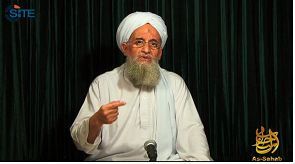
An audio message attributed to Abu Bakr al-Baghdadi surfaced on Twitter on the night of June 14, titled, "Remaining in Iraq and the Levant," in which the ISI leader defied Zawahiri's command and refused to back down from adopting the name "Islamic State in Iraq and the Levant". The voices of the al-Furqan representative and Baghdadi sound similar to those in prior releases, but the means of distribution, via sources other than al-Fajr Center and top-tier jihadi forums, led jihadists to doubt its authenticity. His message, however, is identical to that expounded upon in his speech from April 2013, that the "Islamic State in Iraq and the Levant" is the next step in the growth of al-Qaeda in Iraq.
Baghdadi claimed in the speech that the dispute over the trajectory of jihad in Iraq and Syria is another "tragedy" for the fighters, but his group will not be broken. He stated:
"The Islamic State in Iraq and the Levant remains as long as we have a pulse or an eye that blinks; it remains, and we will not bargain with it or back down from it until Allah the Almighty raises it above or we die without it. It is a state that Abu Musab al-Zarqawi wanted and that mixed with the blood of our Sheikhs Abu Omar al-Baghdadi and Abu Hamza al-Muhajir, and it will not go away from a spot that it has reached, nor will it become smaller after its growth, Allah the Almighty permitting and with His granting of success."
Regarding the Zawahiri letter directly, Baghdadi found it has "several Shariah and method-based issues" and after consulting his Shura Council and Shariah Committee, he decided against following Zawahiri's order to cancel the "Islamic State in Iraq and the Levant" and keep the ISI and al-Nusra Front as separate organizations in Iraq and Syria, respectively.
Shortly after the release of the Baghdadi message, an audio message appeared from ISI spokesman Abu Muhammad al-'Adnani on social networking websites. 'Adnani did not address the dispute between the groups and Zawahiri, or mention Baghdadi, or the ISIL; rather, he called for Sunnis in Iraq to take up arms and declare war on Shi'ites, claiming that fighting is the only way to protect their rights and their properties.
ISIL Spokesman Elaborates on Faults in Zawahiri Letter
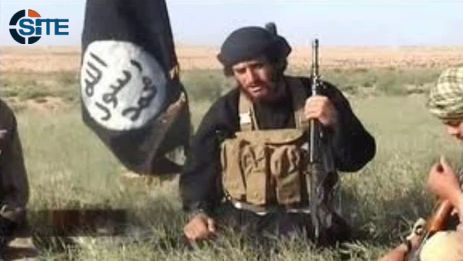
On June 19, a second audio message from 'Adnani was released, titled, "So Leave Them Alone with their Fabrications," in which he was identified as the ISIL - not ISI - spokesman - and spoke at length about the faults in the Zawahiri letter. In the introduction, 'Adnani correctly determined that Baghdadi's message would cause issues, and he then launched into a defense of his leader and his refusal to disengage from Syria. The issue, he argued, is twofold: voiding the ISIL and having both groups operate independently in Iraq and Syria means respecting the man-made borders that delineate the two countries and preventing fighters in one from doing jihad in the other, and also dividing after the Shariah-based obligation of unity had been achieved. He said, for example:
"Creating a rule that is only divided by the borders of Sykes-Picot that are imposed on our Ummah, is support to such ominous borders, which tore apart the body of the Ummah and divided its people and made them imagine that this geographical drawing is a revealed law from heaven from which no one can deviate. Islam doesn't recognize drawn borders to be limited by, and Islam came to preach and spread. This is how this religion was throughout history."
'Adnani also took issue with Zawahiri reprimanding Baghdadi for prematurely revealing the relationship between the ISI and the al-Nusra Front and acting unilaterally in his decisions. The spokesman claimed that problems existed between the two prior to the release of the April 2013 message, and that the al-Nusra Front wished to have independence over its affairs and defect from the group, and Baghdadi issued his speech as a strategic move against them. He said:
"Everyone should know that the defection and disobedience came before the announcement of the state and has nothing to do with the announcement. However, the defectors took it as a pretext and declared the defection after the announcement of the state. They deluded the Ummah that the defection took place as a result of the announcement, but the issue is different from that, for the defection was one of the most important reasons that made the state hasten the announcement, and that was to deter the defection movement and close the gap. That is exactly what took place, praise be to Allah."
Fallout from the Controversy
Shortly after the release of 'Adnani's second message on social networking website, administrators of the Shumukh al-Islam forum issued a statement on June 19 about what it described as "fitna," meaning discord or sedition, between the ISIL and the al-Nusra Front, thus confirming the audios as authentic. They wrote:
"It is not a new phase to the monotheists; rather, what is happening today is a confirmation of the Sunnah [tradition] of hardship that Allah places upon His mujahideen worshipers so as to test their ranks, and purify their followers, and distinguish between the evil from the good and the honest from the liar. It is a cloud that we believe will pass, Allah permitting. This is what we think of our Lord and then of our leaders and emirs. This darkness will go, with Allah's assistance, and the hardship will go, and with Allah's assistance, the ranks will unify, the hearts will be friendlier and the efforts will combine, and this is not difficult for Allah."
Both groups have demanded that the administrators delete from the forum all messages related to the other, and there is currently a power struggle, with each attacking the other's supporters. The administrators also warned jihadists not to take sides in the issue, as their membership will be immediately suspended without notice.
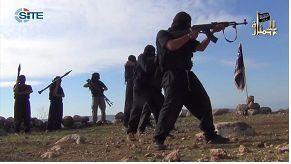
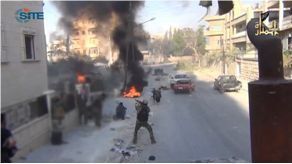
Indeed, some forum users have advocated that fellow jihadists not choose sides in the dispute, but to support both the ISIL and al-Nusra Front equally. One Shumukh user, Fati Muslim Mujahid, posted a message on June 16 from an alleged Saudi fighter in Syria that jihadi supporters should not view the groups as the "Barcelona" and "Real Madrid" football clubs, where they take sides and cheer one and not another. Another member, Abu Mahmoud al-Shami, posted his opinion on June 17 that jihadists should love both Abu Bakr al-Baghdadi and Abu Muhammad al-Julani and not display bias towards one or the other, because both are doing jihad against the enemy, but have different views about the right path. He wrote:
"Whoever loves al-Baghdadi and his soldiers more, then that shouldn't decrease his love for al-Julani and his soldiers; and whoever loves al-Julani and his soldiers more, then that shouldn't decrease his love for al-Baghdadi and his soldiers.
"So, Allah is my witness that I love all of them and I don't differentiate between any of them and I publish all their publications and heroic acts and statements. The disputes must be put aside, because their goal is one, which is to build the Islamic State and raise the banner of tawhid [monotheism], and the joint enemy is one: the Crusaders and Iran and the Rafidahs [Shi'ites] and their expansion project."
Jihadi ideologue Hussein bin Mahmoud replied to al-Shami's post, writing that he is absolutely correct in his advice, and moreover, jihadists should see the jihad by both groups against the enemy as a competition, with each trying to outdo the other to win support:
"Make this disagreement a good thing and a competition between the brothers to harm the enemies, that whoever is more harmful to the enemy will be more accepted and closer to the hearts. Such a competition took place in the time of the Companions, and the Caliph of the Messenger of Allah, Allah's peace and prayer be upon him, Abu Bakr al-Siddiq, ran it with wisdom, and there was one between Khalid bin al-Walid and al-Nu'man bin al-Muqrin in the Persian war, and there was competition in Jihad in the wars of apostasy and the Islamic conquests."
Further, prominent jihadist Asad al-Jihad 2 opined on the issue and Abu Muhammad al-'Adnani's speech from June 19 specifically in posts on his Twitter account later that day. He criticized 'Adnani's harsh tone towards Zawahiri and pointed out flaws in his argument about man-made borders, and unity and division, and other items in his "wave full of lies and falsehood". Asad al-Jihad 2 then went on to engage with fellow Twitter users about problems with 'Adnani's message and that from Abu Bakr al-Baghdadi, holding both accountable for the problems.
Conclusion
The power struggle and subsequent splintering of the ISIL and al-Nusra Front has captivated jihadists as they seek answers about who to support in the dispute, either one side over the other or both equally. It also begs questions about the ISIL operating both in Iraq and Syria as a group competing with the al-Nusra Front or fighting it as it fought nationalist factions in Iraq (e.g. Islamic Army in Iraq) and fellow jihadist groups such as Ansar al-Islam. The group still enjoys admiration and respect from jihadists due to the legacy of Abu Musab al-Zarqawi in founding its predecessor, Tawhid and Jihad Group, and then al-Qaeda in Iraq, but there is erosion in support, especially among prominent jihadists and others who see Abu Bakr al-Baghdadi as causing discord.
Baghdadi and 'Adnani argue that the al-Nusra Front desires independence and to operate away from the ISIL's influence and control. 'Adnani specifically called the al-Nusra Front, "rebellious defectors," and claimed it set the fire of sedition that the ISIL sought to extinguish by revealing their relationship and uniting them under one name. However, while the ISIL is criticizing the al-Nusra Front for desiring power and total control over its affairs, the ISIL and its predecessor, the ISI, has shown itself to be power hungry, trying to crush any and all competition for hearts, minds, men and money in Iraq. In fact, Ansar al-Islam had recently revealed that the ISIL views its group as something of a rival gang due to its fighting its men and threatening that they either join its ranks or be killed.
While the ISIL would view forcing acceptance on fighters as a way to unite for a greater purpose, the al-Nusra Front and Zawahiri saw otherwise, and the latter rebuked the group. Julani and the al-Nusra Front have not released a statement responding to the audio messages from Baghdadi and 'Adnani, nor did they outline their reasons for rejecting the ISIL. Instead, other jihadi groups in Syria such as the Ahrar al-Sham Islamic Movement spoke on the issue, criticizing Baghdadi and the ISIL for unilaterally declaring an "Islamic State" in Syria and potentially bringing new sides to the Syrian conflict by acknowledging the al-Nusra Front's link to it and al-Qaeda.
Jihadists have various perspectives on the issue, with some supporting the ISIL, some supporting the al-Nusra Front, and others supporting both groups equally, for they each represent al-Qaeda and jihad against the enemy. However, those supporting the ISIL seem to be more vocal, as the group is forthcoming to the public about the problems. In the absence of the ISIL's audio messages on top-tier forums al-Fida' and Shumukh al-Islam, and the Ansar al-Mujahideen Arabic forum, the website of the al-Minbar Jihadi Media Network has filled the void by not only providing the messages, but putting a spotlight on them with colorful, animated banners, and Arabic transcripts for easy viewing. Also, some jihadists have spread the messages on their Twitter and YouTube accounts.
Meanwhile, the al-Nusra Front has only released communiqués claiming military operations for March and April, 2013, and has not yet spoken publicly on the issue. Also, the Zawahiri letter has not appeared officially on the forums, nor has an update about the latest turn in the conflict, leading jihadists to speculate more about what is happening behind the scenes with the groups and their respective leaderships, and potentially change their allegiance for whom to support.
This conflict between al-Qaeda's branches in Iraq and Syria and al-Qaeda leadership is the first of its kind and might lead to a new structure, with the possibility that the group in Iraq, the ISIL, will break from the organization and go on a separate path. Indeed, Baghdadi and 'Adnani have each shown insubordination and rejected Zawahiri's command to void the ISIL, and fighters active in Syria have used the ISIL banner since Baghdadi’s announcement in April 2013, and continue to do so, unhindered by the order from al-Qaeda's leader.

